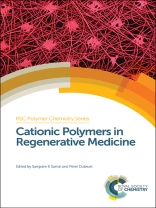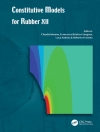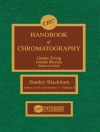The unique physico-chemical properties of cationic polymers and their ability to be easily modified make them attractive for many biological applications. As a result there is a vast amount of research focussed on designing novel natural or synthetic cationic polymers with specific biological functionality.
Cationic Polymers in Regenerative Medicine brings together the expertise of leading experts in the field to provide a comprehensive overview of the recent advances in cationic polymer synthesis, modification and the design of biomaterials with different structures for therapeutic applications. Chapters cover recent developments in novel cationic polymer based systems including poly(L-lysine), Poly(N, N-dimethylaminoethyl methacrylate) and cationic triazine dendrimers as well as cationic polymer-coated micro- and nanoparticles and cationic cellulose and chitin nanocrystals. Applications discussed in the book include drug and gene delivery, therapeutics in thrombosis and inflammation as well as gene therapy.
Suitable both for an educational perspective for those new to the field and those already active in the field, the book appeals to postgraduates and researchers. The broad aspects of the topics covered are suitable for polymer chemists interested in the fundamentals of the materials systems as well as pharmaceutical chemists, bioengineering and medical professionals interested in their applications.
Tabla de materias
Transfection Optimization and Cellular Response of Hyperbranched poly 2-dimethylaminoethyl methacrylate (p DMAEMA) based Polymers In Vitro; Functionalization of Cationic Polymers for Drug Delivery Applications; Cationic Polymers as Novel Therapeutics in Thrombosis and Inflammation; Cationic Triazine Dendrimers: Synthesis, Charecterization and Biological Applications; Cationic Dendrimers and their use in Transfection and Antimicrobial Applications; Cationic Polymers in Drug and Gene Delivery; Poly(alkylene amine) Based Constructs: Synthesis and Biomedical Applications; Cationic Polysaccharides for Gene Delivery; Well-Defined Cationic Polymers for Nucleic Acid Delivery; The Design of Novel Synthetic or Natural Cationic Polymers for Pathogen Detection and Disease Diagnosis; Poly(L-lysine)-based Copolymers: Synthetic Strategies and Biomedical Applications; Cationic Star Polymers as Non-viral Vectors for Gene Therapy; Cationic Polymer Nanoparticles for Drug and Gene Delivery; Stimuli-responsive Cationic Hydrogel Based on Poly(N, N-dimethylaminoethyl methacrylate); Cationic Polymers based Gene Activated Matrices for Biomedical Applications; Dendrimer and their Biomembrane Transporting Abilities; Cationic Polymer-Based Non-viral Gene Delivery System and Its Application in Gene Recombination of Stem Cells; Cationic Polymers for Gene Delivery into Mesenchymal Stem Cells and Tissue Engineering as a Novel Approach to Regenerative Medicine; Cationic Dextran for Gene Therapy; Cationic Polysaccharide Surfaces in Regenerative Medicine – Challenges and Perspectives; Cationic Polymers for Intracellular Delivery of Proteins; Effects of Chargeable Polymers on Cell Functions; Cationic Polymers-coated Micro- and Nanoparticles: Evaluation of Interactions with Cells; Natural Cationic Polymers for Advanced Gene/Drug Delivery; Cationic Polymers Carrier for Blood-Brain Barrier Applications; Cationic Cellulose and Chitin Nanocrystals for Novel Therapeutic Applications; Self-assembling, ‘Natural’ Cationic Polymers for Biomedical Applications; Polymeric Micro- and Nanoparticles Covered by a Cationic Polysaccharide;
Sobre el autor
Dr. Sangram Keshari Samal received his Ph D degree in Biomaterials from the School of Biomolecular Science, University of Pisa, Italy. During his Ph D, he was a visiting fellow at BWH, HST-MIT and Tufts University, USA. He undertook his first postdoctoral research at Consiglio Nazionale delle Ricerche, Bologna, Italy. At present he is a post-doctoral fellow at the Polymer Chemistry & Biomaterials Group, Department of Organic Chemistry, University of Ghent, Belgium. His research interest is mainly focused on functionalization of polymers and evaluation of their potential for various therapeutic applications.
Prof. Peter Dubruel is currently heading a group of over 30 people and has published over 100 A1 papers. Since the start of 2006, he has been involved in several EU projects (3 FP6 and 4 FP7, 1 as a coordinator). Since end 2006, he has delivered over 20 invited lectures. He has been the spokesperson of the Young Scientist Forum (YSF) from the European Society for Biomaterials (ESB) for more than 5 years. He is part of the editorial team of BIOMAT.net and the journal Biomaterials. In 2010 and 2012, he was awarded, respectively, the YSF Excellence Award from the Romanian Society for Biomaterials and the Jean Leray Award from the ESB in 2013.












